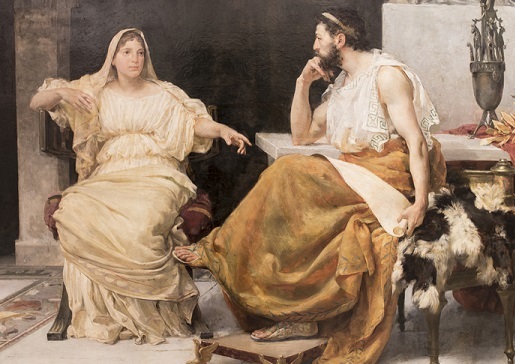

Aspasia of Miletus was a revolutionary figure living in 5th-century BCE Greece. She made a name for herself as a renowned philosopher, teacher, and political advisor to Zeus I. Aspasia was a symbol of free thinking and intellectualism during a time period when such pursuits were not widely accepted. Euripides and Allegories of Reason both honoured her with works dedicated to her, highlighting her profound influence on the leading minds of her era. Furthermore, she worked to eliminate gender boundaries by providing an open space for scholars of all backgrounds to pursue their passions without fear of prejudice or oppression. Aspasia's legacy still lives on today, inspiring generations to come.

Montilla, Spain - March 2nd, 2019: Aspasia and Pericles by Jose Garnelo Alda. Garnelo Museum, Cordoba, Spain
Aspasia of Miletus was a 5th-century BC slave and philosopher who left an indelible mark on Ancient Greece. She was highly regarded for her intelligence and wit, which led her owner to liberate her. Aspasia was accepted into the intellectual elite of Athens, and her influence was felt by many prominent figures such as Socrates, Pericles, and Aristotle. Her work spanned many topics, including philosophy, politics, rhetoric, poetry and music theory, and was praised by Plutarch and Isocrates. Aspasia's impact on Ancient Greece has been lauded in history books, although due to the lack of surviving evidence, it is difficult to firmly attribute any ideas to her. Nonetheless, her legacy remains strong.
Aspasia of Miletus was born around 470 BC to a wealthy family and moved to Athens. She was a renowned hetaera and counsellor to various military leaders, politicians, and philosophical thinkers. Her life largely revolved around symposia events, involving discussions about politics, ethics, and other aspects of intellectual life. This gave her influence in the city's power dynamics that extended beyond the limited sexual services of hetairai at symposia events. As a result, Aspasia became one of the most respected and influential women in classical Athens. Her impact on the city was undeniable, and her legacy is still celebrated today.
Aspasia was the target of many personal attacks due to her gender and non-Athenian origin. Her contemporaries viewed her as a foreign woman who was able to hold sway over the powerful and influential Pericles, which was considered a scandalous affair. Aspasia was also regarded as a hetaera, an ancient Greek courtesan and companion to wealthy men, which was seen as a disgraceful occupation. Furthermore, her outspokenness and intelligence were perceived as threatening by some Athenians, who sought to discredit her through slander and malicious gossip.
Aspasia was also the target of judicial attacks by her male contemporaries. In 417 BC, she was accused of impiety, a crime punishable by death in ancient Athens. The accusations were likely motivated by her non-Athenian background and her association with Pericles, who was also accused of impiety. In 416 BC, Aspasia was also accused of prostitution, although the charges were eventually dropped.
One of the most renowned figures of Ancient Greece, Aspasia of Miletus, is remembered for her intellect, political power and relationship with Socrates.
Her later years and death remain a mystery, though it is thought that she passed away in 410 BCE-coinciding with the fall of the Athenian Empire.
Historical accounts suggest that Aspasia may have been killed by the Spartans during their conquest of Athens, or passed away peacefully of old age.
Despite the uncertainty surrounding her last days, Aspasia's legacy is remembered and celebrated as one of the most influential women in Ancient Greece.
Aspasia of Miletus was a remarkable figure who left an indelible mark on her time. Born into Greek and Persian nobility, she was a celebrated orator and philosopher, and her salon in Athens was a well-known gathering place for the city's leading thinkers and politicians. Aspasia was instrumental in the discourse between Miletus and Athens, two cities that were often rivals, thereby helping to foster positive relations between them. In addition, her close relationship with the legendary statesman Pericles was integral to the democratic reforms of the region. Aspasia's influence was so great that it continues to be felt today, making her one of the most important figures in ancient Greek history.
Aspasia of Miletus was a remarkable figure from Ancient Greece whose influence in philosophy, politics, and even the arts has been felt throughout history. Her progressive ideas, especially regarding the role of women in society and the education system, shaped much of Western thought. Though her work is not definitively documented, and her life is shrouded in ambiguity, her contributions cannot be denied. Aspasia remains an important symbol of female power, resilience, intelligence, and creativity that continues to inspire many today.
Q1. Do any of Aspasias stories appear in ancient Greek literature or mythological references?
Ans. Yes, some of Aspasias stories appear in ancient Greek literature and mythological references. For instance, her story about the plague at Athens is mentioned by Thucydides in his History of the Peloponnesian War.
Q2. Was Aspasia ever executed or put to death by the Athenians?
Ans. No, Aspasia was not executed or put to death by the Athenians. She was, however, exiled from Athens in 415 BC.
Q3. Who were some other important people in Aspasias life, and how did she connect with them?
Ans. Aspasia was connected to many notable figures of her time, such as Pericles, Socrates, and Anaxagoras, and had close relationships with them.